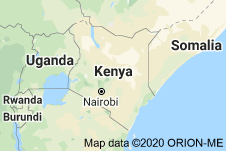
Kenya

Brief Overview
Kenya has made significant political, structural and economic reforms that have largely driven sustained economic growth, social development and political gains over the past decade. However, its key development challenges still include poverty, inequality, climate change, continued weak private sector investment and the vulnerability of the economy to internal and external shocks.
Kenya’s recent political reform stemmed from the passage of a new constitution in 2010 that introduced a bicameral legislative house, devolved county government, a constitutionally tenured Judiciary and electoral body. The first election was in 2013. The August 8, 2017 presidential elections were nullified on September 1, 2017 by the Supreme Court, and a new presidential election was held on October 17, 2017. Kenyan President Uhuru Kenyatta was sworn in for a second and final five-year term on November 28, 2017.
Devolution remains the biggest gain from the August 2010 constitution, which ushered in a new political and economic governance system. It is transformative and has promoted greater investments at the grassroots, strengthened accountability and public service delivery at local levels.
While economic activity faltered following the 2008 global economic recession, growth resumed in the last five years reaching 5.7% in 2019 placing Kenya as one of the fastest growing economies in Sub-Saharan Africa. The recent economic expansion has been boosted by a stable macroeconomic environment, positive investor confidence and a resilient services sector.
Looking ahead, medium-term gross domestic product growth (GDP) is expected to rise to 5.9% in 2020 and 6.0% in 2020 underpinned by private consumption, a pick-up in industrial activity and still strong performance in the services sector. Inflation is expected to remain within the government’s target range while the current account deficit is projected to remain manageable. Growth will also be driven by ongoing key investment to support implementation of the Big 4 development agenda and improved business sentiment. Growth could have been stronger in the absence of interest rate caps that continue to derail recovery in private credit growth.
In addition to aligning fostering economic development through the country’s development agenda to the long-term development plan; Vision 2030, the President in December outlined the “Big Four” development priority areas for his final term as President. The Big Four will prioritize manufacturing, universal healthcare, affordable housing and food security. Social Development
Kenya has met some Millennium Development Goals (MDGs) targets, including reduced child mortality, near universal primary school enrolment, and narrowed gender gaps in education. Interventions and increased spending on health and education are paying dividends. While the healthcare system has faced challenges recently, devolved health care and free maternal health care at all public health facilities will improve health care outcomes and develop a more equitable health care system.
Kenya has the potential to be one of Africa’s success stories from its growing youthful population, a dynamic private sector, highly skilled workforce, improved infrastructure, a new constitution, and its pivotal role in East Africa. Addressing the challenges of poverty, inequality, governance, the skills gap between market requirements and the education curriculum, climate change, low investment and low firm productivity to achieve rapid, sustained growth rates that will transform lives of ordinary citizens, will be a major goal for Kenya.

The Republic of Kenya
Capital: Nairobi
Population: 48.5 million
Area: 582,646 sq km (224,961 sq miles)
Major languages: Swahili, English
Major religion: Christianity
Life Extpectancy; 63 years (men), 69 years (women)
Currency: Kenya shilling
UN, World Bank

Physical Contacts of the Presidency
Name of Minister:
Address:
Telephone:
Fax:
Physical Contacts of the Prime Minister’s Office
Name of Minister:
Address:
Telephone:
Fax:
Physical Contacts of the National Assembly
Name of Speaker of the House:
Address:
Telephone:
Fax:
Physical Contacts of the Chief Of State and Cabinet Ministers
Name of Minister:
Address:
Telephone:
Fax:
Physical Contacts of the Ministry of Interior
Name of Minister:
Address:
Telephone:
Fax
Physical Contacts of the Ministry of Justice
Name of Minister:
Address:
Telephone:
Fax:
Physical Contacts of the Ministry of Foreign Affairs
Name of Minister:
Address:
Telephone:
Fax:
Physical Contacts of the Ministry of Women’s Affairs
Name of Minister:
Address:
Telephone:
Fax:
Physical Contacts of the National Human Rights Commission
Name of Minister:
Address:
Telephone:
Fax:
Physical Contacts of the Police
Name of Inspector General:
Address:
Telephone:
Fax:
Physical Contacts of the Military
Name of Inspector General:
Address:
Telephone:
Fax:
Important Information of Key Human Rights Issues in Kenya
Number Prisons in Kenya
Number Prisoners in Kenya:
Secret Detention Centres:
Police Stations in Kenya
What are the current and ongoing human rights issues in Kenya?
(1) Freedom of the Press
(2) Human Rights Defenders Issues
(3) Impunity
African Union (AU)
Joined the OAU in 1987
Signed the Constitutive Act of The African Union on:
Ratified:Instrument Deposited:
Signed:
Ratified:
Instrument Deposited:
Signed:
Ratified:
Instrument Deposited:
Signed: –
Ratified: –
Instrument Deposited: –
4.Protocol on Amendments to the Protocol on the Statute of the African Court of Justice and Human Rights
Signed: –
Ratified: –
Instrument Deposited: –
Signed: –
Ratified: –
Instrument Deposited: –
Signed: –
Ratified: –
Instrument Deposited: –
Signed: –
Ratified: –
Instrument Deposited: –
Signed: –
Ratified: –
Instrument Deposited: –
Signed: –
Ratified: –
Instrument Deposited: –
Signed: –
Ratified: –
Instrument Deposited: –
Signed: –
Ratified: –
Instrument Deposited: –
Signed: –
Ratified: –
Instrument Deposited: –
Signed: –
Ratified: –
Instrument Deposited: –
Signed: –
Ratified: –
Instrument Deposited: –